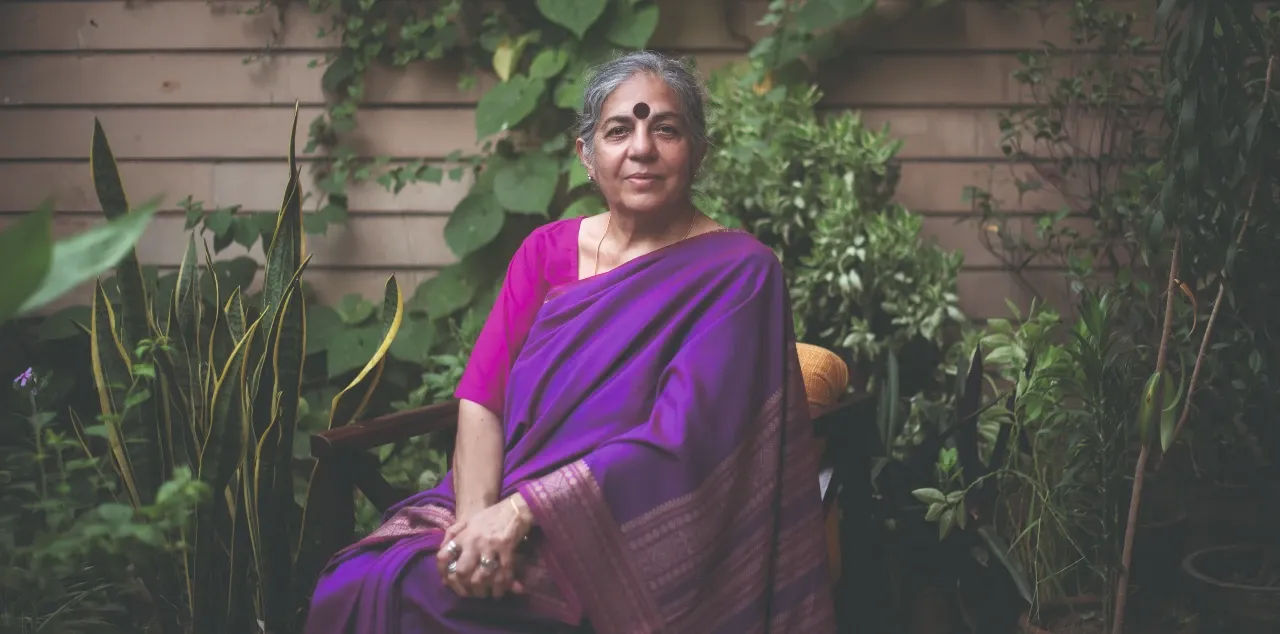Contemporary SpiritualityMeaning and Mysticism in the Modern Age
Explore the foundations of meaning and belief in the modern world, connections between the sacred and profane, and topics including altered states, eco-spirituality, and sacred activism. You will learn how to navigate through these confused times with a greater understanding of spirituality and its place within our intersecting ecosystems of meaning.

taught by Hannah Close
Module 1MODULE 1: Origins of Belief and Demystifying Spirituality
Eddy Elsey exploreS how we can view our culture in a more meaningful light, and how our journeys from cultural tribe - to family - to community have sacred undertones that can bring healing personally and collectively. Nora Bateson's session will explore the meaning crisis. John Vervaeke's session explo...
Module 2MODULE 2: The Church of Consumerism and Colonialism
Vanessa Andreotti discusses the concealed influences shaping our lives by examining the ‘Church of Consumerism’ and our culture of consumption. Gabes Torres explores themes of appropriation and the transcultural exchange of spirituality. Both teachers emphasise the need to confront truths about ongoing ...
Module 3MODULE 3: Dark Green Religion and The Homeward Turn
Timothy Morton delves into ‘Dark Green Religion’ - an emerging spiritual perspective that intertwines eco-spirituality, environmentalism, and the sacredness of the natural world. Dougald Hine explores the reawakening of interest in Western spiritual traditions and a necessary shift away from cultural appr...
Module 4MODULE 4: Improving the West’s Ecstatic Literacy and The Psychedelic Enlightenment
Jules Evans explores how we alternate between excessive aversion, excessive fetishisation when it comes to the ecstatic, and will ask questions about 'ecstatic literacy'. Alexander Beiner discusses what it means for psychedelics to go mainstream in a way that transforms society instead of being captured b...
Module 6MODULE 6: New Horizons of Meaning for an Age of Reckoning and The Future of Spirituality
Elizabeth Oldfield discusses whether or not we are witnessing desecularisation and a new age of new spiritual openness? Reverend Jen Bailey explores spiritual innovators working at the horizons of this new frontier and forging new pathways for the generations to come.
In the midst of a rapidly changing world marked by climate change and fragmentation a paradigm shift is unfolding.
While the modern Western world has long been characterised by its secular and materialistic orientation, a growing number of people, dissatisfied with a fractured culture, inaction and consumerism, are turning to spirituality, or rather rediscovering it, to help navigate complex issues of our time. This convergence of spirituality with the challenges of today reflects a profound shift in how people seek solace, purpose, and solutions in a world of uncertainty.
During this course, you will learn about the foundations of meaning and belief, the connection between the sacred and the profane, the history of spirituality, altered states, eco-spirituality and sacred activism, the confluence between the online world and new age belief, and, ultimately, how to navigate your way through these confused times with a greater understanding of your own spirituality and its place within the intersecting ecosystems of meaning.
It is not advocating for a particular spiritual worldview or tradition. Instead, this course aims to gather people from many traditions and none to assess how our spiritual reorientation is going and where we might place more energy into it - whether to confront that which needs to be changed or uplift that which is generative.
The 'meaning crisis', a term coined by philosopher John Vervaeke, highlights the alienation, disconnection, and existential unease experienced by many in the modern world. This crisis arises partly from the erosion of traditional belief systems and the struggle to find coherent narratives to take their place.
As an inherent part of human nature, spirituality has always expressed itself in our actions - to love and to self-reflect is to roam in the realm of spirit - however, the sectarian infrastructure of modern society has left us with little choice but to construct plasticised, commodified, and abstracted forms of spirituality.
Social media has substituted living communities with parasocial relationships, our connection with the sublime has been replaced with spirit-numbing substances, and our relationship with nature has been usurped by technology. These interventions aren't all bad, but the absence of other sources of spiritual connection in their wake has left a hole in the hearts of many, causing us to lose sight of ourselves, each other, and our ecological home.
We've not lost our instincts to believe. Instead, materialism is revered and many worship at the altar of celebrity. Messiah complexes abound, while the deification and apotheosis of tech gurus continues unimpeded.
Spirituality, in its healthy form(s), offers a framework for exploring profound questions about the nature of existence, our broader connections with the planetary ecology, and our individual and collective search for purpose, providing us with generative sources of meaning far more robust than the temporary dopamine hits found in consumerism. If a crisis of meaning sits at the core of all other crises, then it is no surprise that many seek to lay the foundations of action with spiritual roots.
An increasing number of people are seeking spirituality beyond the perceived confines of traditional institutions, some of which have historically been dogmatic, divisive, and exclusive. Spiritual practices from Eastern cultures, such as yoga and meditation, have become extremely popular. Outside the Yoga Shala, such practices are now being integrated into activism, offering tools to manage stress, cultivate resilience, and foster dialogue, while plant medicine ceremonies are becoming routine among artists as well as business people.
The resurgence of interest in ancient wisdom traditions highlights the pursuit of direct spiritual experiences and a rediscovery of timeless truths that transcend dogma and rigid belief systems. Many are embracing spiritual practices rooted in indigenous wisdom and Eastern philosophies to develop a more sustainable relationship with the environment.
The existential threat of climate change has forced many to confront the interconnectedness of all life on Earth. Eco-spirituality, a growing movement, emphasises the interconnectedness of all life and encourages a deep reverence for nature. It offers a framework for understanding environmental issues as moral imperatives, rooted in the idea that caring for the Earth is a spiritual duty.
Integrating other forms of spirituality into modern Western culture is not without its challenges. It can lead to the commodification and appropriation of cultural traditions, where ancient wisdom is repackaged and sold as a quick fix for modern problems, while indigenous people are fetishised and further exploited. Furthermore, there is a risk of spiritual bypassing, where spirituality becomes a means to escape difficult emotions or avoid taking tangible action on pressing issues.
Nonetheless, integrating other forms of spirituality into modern Western culture, as well as reviving traditions originating in the West, can foster positive change when approached with sincerity and a commitment to ethical principles. It offers a path towards greater empathy, environmental responsibility, and a renewed sense of purpose.
- 6 Modules
- 2 Reflection sessions
- 12+ Teachers
- Curated readings and reflections
- Community discussion area
- Learn about different spiritual traditions and where they find their place in the context of our current moment
- Better understand how spirituality provides productive ground for individuals and communities to build meaningful actions and movements
- Question dogmatism and explore spiritual perspectives
- Explore the relationship between belief, meaning, identity, culture, community and spirituality
- Better understand the differences between religion and spirituality













